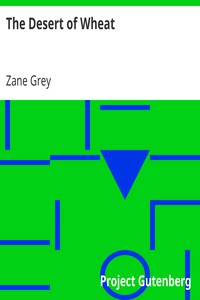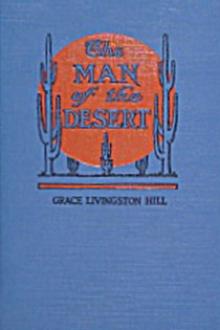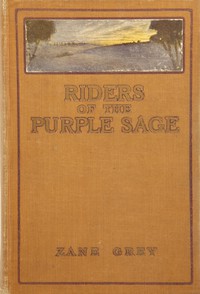The Desert of Wheat, Zane Grey [good non fiction books to read .TXT] 📗

- Author: Zane Grey
Book online «The Desert of Wheat, Zane Grey [good non fiction books to read .TXT] 📗». Author Zane Grey
"I heard you tell father you had studied wheat," said the girl, presently, evidently trying to make conversation.
"Yes, all my life," replied Kurt. "My study has mostly been under my father. Look at my hands." He held out big, strong hands, scarred and knotted, with horny palms uppermost, and he laughed. "I can be proud of them, Miss Anderson.… But I had a splendid year in California at the university and I graduated from the Washington State Agricultural College."
"You love wheat—the raising of it, I mean?" she inquired.
"It must be that I do, though I never had such a thought. Wheat is so wonderful. No one can guess who does not know it!… The clean, plump grain, the sowing on fallow ground, the long wait, the first tender green, and the change day by day to the deep waving fields of gold—then the harvest, hot, noisy, smoky, full of dust and chaff, and the great combine-harvesters with thirty-four horses. Oh! I guess I do love it all.… I worked in a Spokane flour-mill, too, just to learn how flour is made. There is nothing in the world so white, so clean, so pure as flour made from the wheat of these hills!"
"Next you'll be telling me that you can bake bread," she rejoined, and her laugh was low and sweet. Her eyes shone with soft blue gleams.
"Indeed I can! I bake all the bread we use," he said, stoutly. "And I flatter myself I can beat any girl you know."
"You can beat mine, I'm sure. Before I went to college I did pretty well. But I learned too much there. Now my mother and sisters, and brother Jim, all the family except dad, make fun of my bread."
"You have a brother? How old is he?"
"One brother—Jim, we call him. He—he is just past twenty-one." She faltered the last few words.
Kurt felt on common ground with her then. The sudden break in her voice, the change in her face, the shadowing of the blue eyes—these were eloquent.
"Oh, it's horrible—this need of war!" she exclaimed.
"Yes," he replied, simply. "But maybe your brother will not be called."
"Called! Why, he refused to wait for the draft! He went and enlisted. Dad patted him on the back.… If anything happens to him it'll kill my mother. Jim is her idol. It'd break my heart.… Oh, I hate the very name of Germans!"
"My father is German," said Kurt. "He's been fifty years in America—eighteen years here on this farm. He always hated England. Now he's bitter against America.… I can see a side you can't see. But I don't blame you—for what you said."
"Forgive me. I can't conceive of meaning that against any one who's lived here so long.… Oh, it must be hard for you."
"I'll let my father think I'm forced to join the army. But I'm going to fight against his people. We are a house divided against itself."
"Oh, what a pity!" The girl sighed and her eyes were dark with brooding sorrow.
A step sounded behind them. Mr. Anderson appeared, sombrero off, mopping a very red face. His eyes gleamed, with angry glints; his mouth and chin were working. He flopped down with a great, explosive breath.
"Kurt, your old man is a—a—son of a gun!" he exclaimed, vociferously; manifestly, liberation of speech was a relief.
The young man nodded seriously and knowingly. "I hope, sir—he—he—"
"He did—you just bet your life! He called me a lot in German, but I know cuss words when I hear them. I tried to reason with him—told him I wanted my money—was here to help him get that money off the farm, some way or other. An' he swore I was a capitalist—an enemy to labor an' the Northwest—that I an' my kind had caused the war."
Kurt gazed gravely into the disturbed face of the rancher. Miss Anderson had wide-open eyes of wonder.
"Sure I could have stood all that," went on Anderson, fuming. "But he ordered me out of the house. I got mad an' wouldn't go. Then—by George! he pulled my nose an' called me a bloody Englishman!"
Kurt groaned in the disgrace of the moment. But, amazingly, Miss Anderson burst into a silvery peal of laughter.
"Oh, dad!… that's—just too—good for—anything! You met your—match at last.… You know you always—boasted of your drop of English blood.… And you're sensitive—about your big nose!"
"He must be over seventy," growled Anderson, as if seeking for some excuse to palliate his restraint. "I'm mad—but it was funny." The working of his face finally set in the huge wrinkles of a laugh.
Young Dorn struggled to repress his own mirth, but unguardedly he happened to meet the dancing blue eyes of the girl, merry, provocative, full of youth and fun, and that was too much for him. He laughed with them.
"The joke's on me," said Anderson. "An' I can take one.… Now, young man, I think I gathered from your amiable dad that if the crop of wheat was full I'd get my money. Otherwise I could take over the land. For my part, I'd never do that, but the others interested might do it, even for the little money involved. I tried to buy them out so I'd have the whole mortgage. They would not sell."
"Mr. Anderson, you're a square man, and I'll do—" declared Kurt.
"Come out an' show me the wheat," interrupted Anderson. "Lenore, do you want to go with us?"
"I do," replied the daughter, and she took up her hat to put it on.
Kurt led them through the yard, out past the old barn, to the edge of





Comments (0)